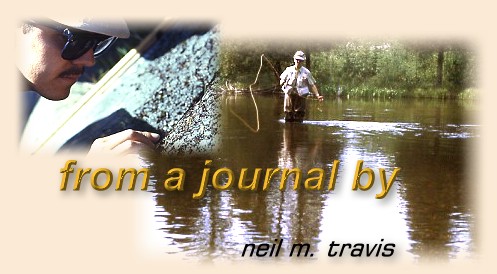THE TECHNOLOGICAL ANGLER
In 1653 Izaak Walton published the first edition of his book, The Compleat Angler. This single edition, reprinted many times since that original edition and still available today, started a cavalcade of books on angling that continues until the present. While predated by Dame Juliana Berners book in 1496, The Book of St. Albans, which contained, among other things, a description of what would become the sport of fly fishing. Her "jury" of 12 flies formed the bases for the fly patterns that would be developed in the coming centuries.
Walton, while making note in his book about fishing with artificial flies, was mostly a bait man. In the fifth edition of Walton's book in 1676 a young man by the name of Charles Cotton wrote a second book, which was included in Walton's book which was about fishing for trout and grayling with flies. It was so well written that it earned Cotton the distinction among most angling historians as the father of modern fly-fishing.
I hazard the guess that if Walton was writing his book today he would not have called it The Compleat Angler but The Technological Angler. Walton's concept of the sport of angling was one of contemplative enjoyment and his writings were not so much intended to instruct one on angling but rather upon the quiet enjoyment of the sport. His book ends with this admonition: "Study to be quiet," which is a quotation from the Bible. [I Thess. 4:11]
In today's world we have less interest in the contemplative side of angling than was displayed by Walton and many of his contemporaries. Most anglers today believe that the key to being a successful angler is to be found in equipment and information. Unfortunately, while we have access to more information than at any time in history many fly fishers are woefully ignorant about the history of the sport. Fly fishing has an exceeding rich history, complete with a cast of characters that could easily fill the pages of a best-selling novel. There are theories aplenty and fierce battles have been fought, and in some places those battles still simmer.
Today we are less inclined to concern ourselves with many of the niceties that were considered critical to many of the anglers of yore. We are far more pragmatic, more results oriented, and more dependent upon technology than finesse. Many are not willing or unable to spend the time learning by doing and instant access to "knowledge" is only a mouse click away. The results are that we have more "well-informed" anglers today that are conversant with the latest equipment, the newest "hot" flies and all the correct casting methods, but lacking in actual experience on the water. Anglers are increasingly become willing victims of technology, eagerly chasing after every new bauble that holds the promise of a quicker access to proficiency.
Technology is a wonderful tool but it is nothing more than a tool. A paint brush is just an inanimate object, but in the hands of a trained and practiced artist it can create much beauty. Likewise, knowledge without experience is merely a collection of facts without any relationship to practicality. We become reactionary robots, like the children following the Pied Piper, so many rats dancing to whatever tune is being piped.
